高中英语词汇学习需要掌握的十二个概念
高一英语必修二单词知识点梳理

高一英语必修二单词知识点梳理英语词汇是学习英语的基石,掌握词汇对于提高英语能力至关重要。
高一英语必修二是初中英语词汇知识的延伸和深化,涉及各个主题和场景的词汇学习。
本文将对高一英语必修二的单词知识点进行梳理,帮助学生更好地记忆和运用这些词汇。
首先,我们来看一些与人物特征和性格相关的词汇。
在高一英语必修二中,涉及了一些描述人物特征和性格的词汇,如"ambitious"(有雄心壮志的),"arrogant"(傲慢的),"considerate"(体贴的),"courageous"(勇敢的),"enthusiastic"(热情的),"honest"(诚实的)等等。
通过学会这些词汇,我们可以更准确地描述一个人的性格特征,从而更好地理解他们的行为和思维方式。
除了人物特征和性格,高一英语必修二还介绍了一些关于教育和学习的词汇。
比如,"advice"(建议),"attitude"(态度),"knowledge"(知识),"study"(学习),"experience"(经验)等等。
这些词汇有助于我们用英语讨论学习和教育相关的话题,从而扩展我们的词汇量和表达能力。
此外,在高一英语必修二中,我们还学习了一些与健康和生活方式相关的词汇。
例如,"exercise"(锻炼),"healthy"(健康的),"diet"(饮食),"stress"(压力),"smoke"(吸烟)等等。
这些词汇使我们能够讨论和阐述有关健康和生活方式选择的话题,帮助我们更好地了解如何保持健康的生活习惯。
此外,在高一英语必修二的单词中,有一部分词汇与旅行和文化有关。
高中英语重点词汇讲解

U1 重点词汇讲解一、重点词汇列表二、精选词汇讲解1. experience(1)可数名词“经历”something that happens to you or something you do, especiallywhen this has an effect on what you feel or think:This was my first experience of living abroad.Failing an exam was a new experience for me.Getting caught in the flood was quite an experience for me.(2)不可数名词“经验”knowledge or skill that you gain from doing a job or activity, or theprocess of doing this:Experience is the best teacher.I have some first-hand experience in skiing.Nowadays people prefer to hire someone with work experience.(3)动词to feel, to suffer, to know an experience:Have you ever experienced real hunger?It’s the most wonderful feeling that I have ever experienced.(4)experience →experienced形容词,“有经验的”an experienced teacheran experienced reporter* be experienced at/in +名词/doing somethingShe is quite experienced in medicine.Jenny is experienced at teaching beginners.Tom is experienced in dealing with difficult customers.2. attend动词(1)“出席,到场”to go to …, to be present at …* 及物动词vt.Did you attend the meeting yesterday?He didn’t attend his brother’s wedding.* 不及物动词vi.Please let me know if you are unable to attend.Everyone is expected to attend.(2) “上学,上课”to go regularly to a schoolHe is the first one in his family to attend college.Though he was born in China, he attended high school in the US.3. earn 动词(1)“挣钱”to receive money by workingShe doesn’t earn much money, but she enjoys the work.Most people in this company earns around 50 thousand dollars a year.earn a living = make a livingearn one’s living = make one’s livingHe earns his living as a teacher.(2)“赢得”to get something as a result of one’s effortsHe earned a lot of praise because of his honesty.She earned a reputation as the best teacher of the school.His achievement earned him respect and admiration.4. average(1) 形容词*“平均的”:the average rainfall平均降雨量the average temperature平均气温Tom is of average height.The average age of the students in this school here is 16.*“一般的,普通的”neither very good nor very badShe looks like an average teacher.An average American eats more than 10 pounds of chocolate a year.(2) 名词*“平均,平均数”The average of five and three is four.Do you know how to work out an average? 你知道怎样算平均数吗?This year’s rainfall comes close to the average.(3) average的词组:* on (the) averageOn average, I receive 15 e-mails every day.On the average, men still earn more than women.* above (the) average / below (the) averageHer grades are above the average.The cost of living in this city is below the average.5. donate动词“捐献,捐款”to give something, especially money, to a person or an organization in order to help them:* donate something to somebody/somethingLast year he donated $1,000 to cancer research.She donated one million yuan to the Hope Project.Now more and more people volunteer to donate blood to the blood bank.* donate →donation 名词“捐献”donation to…There have been donations from around the world to the flooded areas.Would you like to make a donation to the school?6. regret(1) 动词过去式、过去分词:regretted, 现在分词:regretting* 懊悔、悔恨、惋惜to feel sorry about something you have done and wish you had not done it:I've never regretted the decision.Don't do anything you might regret.* regret doing somethingI now regret leaving school so young.He deeply regrets losing his temper last night.* regret + that- 分句He was beginning to regret that he'd come along.She regrets that she never went to college.* 对……感到抱歉、遗憾used in official letters or statements when saying that you aresorry or sad about something:We regret any inconvenience caused to our customers.* regret + that- 分句I regret that I will be unable to attend your lecture.* regret to do (regret to say / inform / tell …)I regret to inform you that you owe the bank $10,000.We regret to tell you that you failed in your driving test.(2) 名词懊悔、悔恨、惋惜sadness that you feel about something, especially because you wish it had not happened:He said he had no regrets about leaving the city.She has already expressed deep regret for what happened.* with regretThey said goodbye with deep regret.I decided with some regret that it was time to move on.* to somebody's regretI lost touch with her, much to my regret.To our regret, he was not accepted by Harvard.7. run动词“控制、管理”to organize or be in charge of an activity, business, organization, or country:For a while, she ran a restaurant in Boston.Some married women manage to work out and run a home as well.well-run ←→badly-runThe hotel is well-run and very popular.The hotel is badly-run and not popular at all.8. approve(1) 及物动词“批准,通过”to officially accept a plan, proposal, etc.:The President approved the building plan.(2) 不及物动词“赞成,认可,同意”to think that something /somebody is good, right, orsuitable* approve ofHer parents don’t approve of their marriage.I don’t approve of your choice.(3) approve →approval 名词approve →disapprove反义词9. inform动词,“通知”to officially tell someone about something or give them information:* inform somebody about/of somethingPlease inform us of any change of address as soon as possible.They decided to inform the police of the missing boy.* inform somebody + that-从句We regret to inform you that your application has been rejected.Unfortunately we were informed that the lecture had been cancelled, so we didn’t go. 三、词汇拓展训练(一)单项填空:1. ---- Are you free tomorrow afternoon?---- I’m afraid not. I’ll have to __________ an important lecture given by a famous professor.A. joinB. take part inC. attendD. enter2. The Chief Manager made a donation of one million _________ the City Museum.A. toB. atC. onD. for3. They failed to finish the project in time. I regretted _________ them.A. to be not able to helpB. being not able to helpC. not being able to helpD. not be able to help4. Still, some women do not have any full-time jobs because their husbands do not ________.A. agreeB. approveC. allowD. admit5. History is my favorite subject. So I think I’ll __________ physics and chemistry when I reach Senior II.A. stopB. dropC. desertD. leave6. Through hard work you will ________ the respect of your fellow workers.Which of the following is not appropriate?A. gainB. earnC. winD. accept7. We’ll be having a picnic this afternoon by the lake. Why don’t you come and ________ us?A. take part inB. attendC. joinD. enter8. It is ________ deep regret that we have to report the death of the pupils.A. toB. ofC. withD. in9. We will inform you __________ writing ________ the changes as soon as possible.A. for … inB. at … onC. in … ofD. on … about10. He is a great success as a scientist, but he hasn’t ________in teaching.A. many experiencesB. much experienceC. an experienceD. a lot of experiences(二)单词拼写:1. The job wasn’t ___________ enough for me. I want something more creative. (富有挑战性的)2. She is studying American ____________ at Georgetown University at present. (文学)3. The students are working hard every day, in ___________ for the big examination. (准备)4. Older people often complain that the younger ____________ don’t know what hard work is. (一代人)5. It takes an _________ of two weeks to finish a task like this. (平均)6. The village schools are in great need of ______________ teachers. (有经验的)7. Have a rest before you __________ with your reading. (继续)8. The Internet is ___________ at a very fast speed. (发展)9. People in this neighborhood can use the gym at no _________ cost. (额外的)10. The Ming ___________ ruled China from 1368 to 1644. (朝代)(三)词组填空:1. According to this research, ________ women live between five to seven years longer than men.2. Before I open the letter, let’s _________ ourselves _______ the news, whether it is good or bad.3. I think doctors should ________ the patients _______ the side effects of the medicine they take.4. Peter, I want to _________ you _________ my family.5. He has offered to do the job ___________.6. Do you think you are willing to ___________ some of your time ________ the volunteer work?1. I lost touch with her, much ____________.2. Her performance last night was well ____________, which surprised everyone.3. I do not ____________ your choice of friends.4. If you don’t _____________ the teacher in class, I don’t think you will pass the examination.5. You will soon regret it if you ___________.6. If you want to be a good boss, you will have to ____________ from your employees first.(四)综合填空:1. ---- How was your trip to Beijing?---- Great. My only r___________ was that I had no time to visit the Great Wall.2. ---- What are we having for d___________?---- Ice-cream, cheese cake and chocolate pudding.3. ---- How much are these books?---- Five dollars each. But if you buy two, you could get the third one for f_______.4. ---- May I i___________ myself? I’m Jerry Blom, assistant to Dr. Smith.---- Nice to meet you.5. ---- Why don’t you buy that cellphone? It’s 30% off today!---- Not unless my parents a____________.6. ---- What’s the matter, officer? I was driving at 50 miles an hour. I wasn’t speeding.---- Sir, you are r___________ by law to wear a seat belt.7. ---- What’s your new boss like?---- Oh, she is hard to p________. Everything should be perfect.8. ---- Look at the mistakes! You are not paying a___________ in class!---- I’m sorry sir. I promise I’ll listen more carefully.9. ---- Wha t’s your secret to success?---- The reason I a__________ good results is that I work hard. So could you!10. ---- Do you agree with me?---- I totally disagree with you, but I r__________ your opinion.(五)短文填空:I studied at a British high school for one school year. It was quite an ___1___ for me. My class with 29 students is of ___2___ size in Britain, but much smaller according to the Chinese standard. At first, I find the homework a little ___3___ as everything was in English, but I soon got used to it. Later I made great progress in English. I worked hard and ___4___ high grades so I earned ___5____ from my classmates. After school I enjoyed ___6___ under a tree or sitting on the grass. When I ___7___ my family and friends, I would ___8___ them at lunchtime in the school Computer Club for ___9___. One thing I like about British food is the ___10___ after the main meal.KEYS(一)单项填空:1-5: CACBB 6-10: DCCCB(二)单词拼写:1. challenging2. Literature3. preparation4. generation5. average6. experienced7. continue8. developing9. extra 10. Dynasty (三)词组填空:A1. on average2. prepare … for3. inform … of4. introduce … to5. for free6. donate … toB1. to my regret2. above average3. approve of4. pay attention to5. miss the chance6. earn respect(四)综合填空:1. regret2. dessert3. free4. introduce5. approve6. required7. please8. attention9. achieve 10. respect (五)短文填空:1. experience2. average3. challenging4. achieved5. respect6. relaxing7. missed8. e-mail9. free 10. dessert。
高中英语“一词多义”重点词汇大汇总!必须掌握!

高中英语“一词多义”重点词汇大汇总!必须掌握!英语需要记忆的词汇较多,同学们记忆也比较困难,其中还有一些单词一词多义,答题时容易产生误差,为此,小编整理了高中阶段英语必考的一词多义词汇和例句,方便大家重点记忆!记得收藏起来随时看~A1.accident① 事故(n.) I saw an accident when I walked in the street.② 意外、偶然的事(n.) (accidentally)2.appear① 出现 (vi) A ship appeared on the horizon. (disappear消失)② 好象,似乎(vi) She appears to have many friends.3.apply① 申请(for)(vi) Mr.Wang decided to apply for the job.② 运用、应用(to)(vt.) Our teacher applies this teaching method to his class.4.arm 手臂 (n.) 武装 (v)Lay down your arms or we'll fire!放下武器,否则,我们就开枪了!Police say the man is armed with guns and very dangerous. 警察说该男子携有枪,十分危险。
5.area① 地区(n.) Do you like the area where you are living?② 面积(n.) The city covers an area of 30,000 square kilometer.6.ask (熟义:问)vt.要求The teacher asked that all the students stay at the classroom. 老师要求所有学生呆在教室7.attend (熟义:出席) vt.参加;vi.看护,治疗Mr.Park attended a summer course.帕克先生参加一个暑期课程。
对英语课标核心词汇
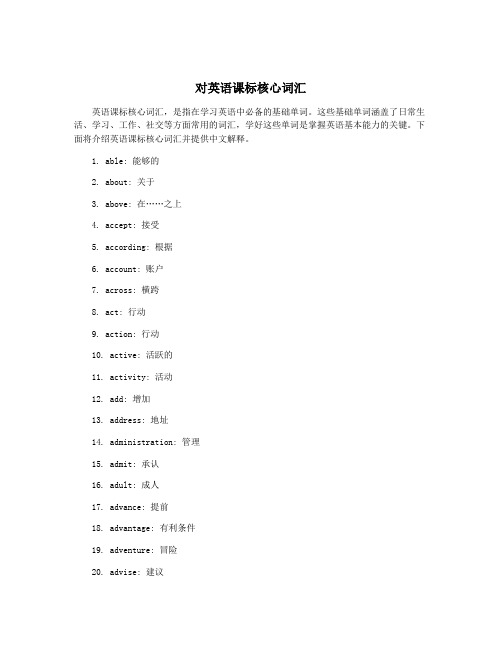
对英语课标核心词汇英语课标核心词汇,是指在学习英语中必备的基础单词。
这些基础单词涵盖了日常生活、学习、工作、社交等方面常用的词汇,学好这些单词是掌握英语基本能力的关键。
下面将介绍英语课标核心词汇并提供中文解释。
1. able: 能够的2. about: 关于3. above: 在……之上4. accept: 接受5. according: 根据6. account: 账户7. across: 横跨8. act: 行动9. action: 行动10. active: 活跃的11. activity: 活动12. add: 增加13. address: 地址14. administration: 管理15. admit: 承认16. adult: 成人17. advance: 提前18. advantage: 有利条件19. adventure: 冒险20. advise: 建议251. care: 照顾252. career: 职业253. careful: 小心的254. carriage: 四轮马车 255. carry: 携带256. cartoon: 卡通257. case: 案例258. castle: 城堡259. catch: 捕捉260. category: 类别311. close: 关闭的312. cloth: 布料313. clothes: 衣服314. cloud: 云315. club: 俱乐部316. clue: 線索317. coach: 教练318. coal: 煤319. coast: 沿海320. coat: 外套441. dance: 跳舞442. danger: 危险443. dare: 敢444. dark: 黑暗的445. data: 数据446. date: 日期 447。
高中英语常见名词词汇

常见名词词汇1.sense五种感觉官能;辨别力,理解力,领悟力,识别力;常识,见识;意义a sense of hearing/sight/smell/taste/toucha sense of humor/direction/shame/responsibilitycommon sense常识What’s the sense/point of doing sth?feeling知觉,感觉,感触,态度,看法feelings感情mood心境,情绪in a good /bad moodspirit精神,心灵,灵魂,勇气,心态,烈酒,酒精spirits精神状态,情绪,心境in high/low spirits temper脾气,心情,性情,心境lose one’s temper发脾气2.idea主意,想法get the idea 理解have no idea (don’t know)mind头脑,心思,才智,人的思想,注意力,记性be sound in mind and body身心健康bear/keep sb/sth in mind 记住----have sth in mind 考虑-----make up one’s mindout of one’s mind 发狂absence of mindopinion意见,看法,主张in one’s opinion/in their opinionthought思考,思想,思潮,看法,想法,意见,意向,意图(on)second thought(s)(经重新考虑后)改变的想法(又一想)lost in thought 陷入沉思view视野,(从某种角度看到的)风景,个人的意见,态度;(对问题的)想法,见解in one’s view 在某人看来in view of 鉴于,由于,考虑到point地点,位置;某一时刻,阶段;地步,程度;要点,论点,见解,观点You’ve got the point there你说得对。
高考英语知识点速记高频词汇的归纳与总结

高考英语知识点速记高频词汇的归纳与总结高考英语对于每一位考生来说都是至关重要的,而词汇作为英语学习的基础,更是重中之重。
掌握高频词汇不仅能够提高阅读理解和听力理解的能力,还能在写作和翻译中准确表达自己的意思。
接下来,让我们一起对高考英语中的高频词汇进行归纳与总结。
一、动词类1、 achieve 意为“实现;达到”例句:He finally achieved his dream of becoming a doctor (他最终实现了成为医生的梦想。
)2、 acquire 表示“获得;取得”例如:She acquired a good knowledge of English through hard work (她通过努力学习获得了良好的英语知识。
)3、 adapt 有“适应;改编”的意思如:The new students are slowly adapting to the school life (新生们正在慢慢地适应学校生活。
)4、admit “承认;准许进入”He admitted his mistake (他承认了自己的错误。
)5、 apply “申请;应用”She applied for the job (她申请了这份工作。
)6、appreciate “欣赏;感激”I really appreciate your help (我非常感激你的帮助。
)7、approach “接近;方法”As we approached the house, we saw a dog (当我们接近那所房子时,我们看到了一只狗。
)8、assume “假定;承担”We assume that he is innocent until proven guilty (在被证明有罪之前,我们假定他是无辜的。
)9、attract “吸引”The beautiful scenery attracts many tourists every year (美丽的风景每年吸引许多游客。
高中英语标准词汇表3600
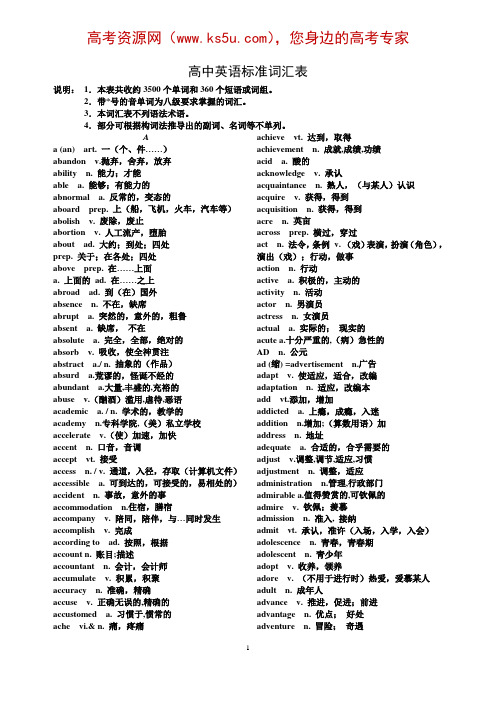
高中英语标准词汇表说明:1.本表共收约3500个单词和360个短语或词组。
2.带*号的音单词为八级要求掌握的词汇。
3.本词汇表不列语法术语。
4.部分可根据构词法推导出的副词、名词等不单列。
Aa (an) art. 一(个、件……)abandon v.抛弃,舍弃,放弃ability n. 能力;才能able a. 能够;有能力的abnormal a. 反常的,变态的aboard prep. 上(船,飞机,火车,汽车等)abolish v. 废除,废止abortion v. 人工流产,堕胎about ad. 大约;到处;四处prep. 关于;在各处;四处above prep. 在……上面a. 上面的ad. 在……之上abroad ad. 到(在)国外absence n. 不在,缺席abrupt a. 突然的,意外的,粗鲁absent a. 缺席,不在absolute a. 完全,全部,绝对的absorb v. 吸收,使全神贯注abstract a./ n. 抽象的(作品)absurd a.荒谬的,怪诞不经的abundant a.大量,丰盛的,充裕的abuse v.(酗酒)滥用,虐待,恶语academic a. / n. 学术的,教学的academy n.专科学院,(美)私立学校accelerate v.(使)加速,加快accent n. 口音,音调accept vt. 接受access n. / v. 通道,入径,存取(计算机文件)accessible a. 可到达的,可接受的,易相处的)accident n. 事故,意外的事accommodation n.住宿,膳宿accompany v. 陪同,陪伴,与…同时发生accomplish v. 完成according to ad. 按照,根据account n. 账目;描述accountant n. 会计,会计师accumulate v. 积累,积聚accuracy n. 准确,精确accuse v. 正确无误的,精确的accustomed a. 习惯于,惯常的ache vi.& n. 痛,疼痛achieve vt. 达到,取得achievement n. 成就,成绩,功绩acid a. 酸的acknowledge v. 承认acquaintance n. 熟人,(与某人)认识acquire v. 获得,得到acquisition n. 获得,得到acre n. 英亩across prep. 横过,穿过act n. 法令,条例v. (戏)表演,扮演(角色),演出(戏);行动,做事action n. 行动active a. 积极的,主动的activity n. 活动actor n. 男演员actress n. 女演员actual a. 实际的;现实的acute a.十分严重的,(病)急性的AD n. 公元ad (缩) =advertisement n.广告adapt v. 使适应,适合,改编adaptation n. 适应,改编本add vt.添加,增加addicted a. 上瘾,成瘾,入迷addition n.增加;(算数用语)加address n. 地址adequate a. 合适的,合乎需要的adjust v.调整,调节,适应,习惯adjustment n. 调整,适应administration n.管理,行政部门admirable a.值得赞赏的,可钦佩的admire v. 钦佩;羡慕admission n. 准入, 接纳admit vt. 承认,准许(入场,入学,入会)adolescence n. 青春,青春期adolescent n. 青少年adopt v. 收养,领养adore v. (不用于进行时)热爱,爱慕某人adult n. 成年人advance v. 推进,促进;前进advantage n. 优点;好处adventure n. 冒险;奇遇1advertise vt. 为……做广告advertisement n. 广告advice n. 忠告,劝告,建议advise vt. 忠告,劝告,建议advocate v. 拥护,支持,提倡aeroplane n. (英)飞机affair n. 事,事情affect vt. 影响affection n. 喜爱,钟爱afford vt. 负担得起(……的费用);抽得出(时间);提供afraid a. 害怕的;担心Africa * n. 非洲African a. 非洲的,非洲人的n. 非洲人after ad. 在后;后来prep. 在…之后;在后面conj. 在…以后afternoon n. 下午,午后afterward(s) ad. 后来again ad. 再一次;再,又against prep. 对着,反对age n. 年龄;时代agency n. 代理机构agenda n. (会议)议程表,议事日程agent n. 代理人,经济人aggression n. 侵略aggressive a. 侵略的;咄咄逼人ago ad. 以前agree v. 同意;应允agreement n. 同意,一致;协定,协议agricultural a. 农业的agriculture n. 农业,农学ahead ad. 在前,向前aid n. 援助;救护;辅助器具AIDS n. 艾滋病aim n.目的;目标v. 计划,打算;瞄准;针对air n. 空气;大气aircraft n. 飞机(单复数同)airline n. 航空公司;航空系统airmail n. 航空邮件airplane n. (美)飞机airport n. 航空站,飞机场airspace n.领空,(某国的)空域alarm n. 警报album n. 相册,影集,集邮簿alcohol n. 含酒精饮料,酒alcoholic a. / n. 含酒精的,酒鬼algebra n. 代数alike ad. 很相似地,同样地alive a. 活着的,存在的all ad. 全部地a. 全(部);所有的;总;整pron.全部;全体人员allergic a. 过敏的,厌恶alley n. 小巷,胡同allocate v. 拨给,划归,分配…给allow vt. 允许,准许allowance n. 津贴,补助almost ad. 几乎,差不多alone a. 单独的,孤独的along ad. 向前;和…一起;一同prep. 沿着;顺着alongside ad.在…旁边,与…同时aloud ad. 大声地alphabet n. 字母表,字母already ad. 已经also ad. 也alternative a.可供替代,非传统的although conj. 虽然,尽管altitude n. 海拔高度altogether ad. 总共aluminium n. (化)铝always ad. 总是;一直;永远am v. be的人称形式之一a.m./A.M. n. 午前,上午amateur a. 业余爱好的amaze v. 惊奇,惊叹;震惊amazing a.惊奇,惊叹的;震惊的ambassador (ambassadress) n.大使ambiguous a. 模棱两可的ambition n.目标,野心,雄心,抱负ambulance n. 救护车America * n. 美国;美洲American a. 美国的;美国人的n. 美国人among prep. 在…中间;在(三个以上)之间amount n. / v. 金额,数量,总计ample a. 足够的,丰裕的amuse vt. (使人)快乐,逗乐amusement n. 娱乐analyse v. 分析analysis n. 分析,分析结果ancestor n. 祖宗;祖先acchor v. / n. 锚,抛锚ancient a. 古代的,古老的and conj. 和;又;而anecdote n. 逸事,趣闻anger n. 怒,愤怒angle n. 角度angry a. 生气的,愤怒的animal n. 动物ankle n. 踝,踝关节2anniversary n. 周年纪念日announce vt. 宣布,宣告announcement n. 通告,通知annoy vt. (使)烦恼annual a. 每年的,年度的,一年一次的another a. 再一;另一;别的;不同的pron. 另一个answer n.回答,答复;回信;答案v.回答,答复;回信;(作出)答案ant n. 蚂蚁Antarctic a. 南极的the Antarctic 南极Antarctica * n. 南极洲antique n. 古董anxiety n. 担忧,焦虑anxious a. 忧虑的,焦急的any pron. (无论)哪一个;哪些任何的;(用于疑问句、否定句)一些;什么anybody pron. 任何人,无论谁anyhow ad. 不管怎样anyone pron. 任何人,无论谁anything pron. 什么事(物);任何事(物)anyway ad. 不管怎样anywhere ad. 任何地方apart ad, / a. 相隔,相距,除外apartment n. (美)楼中单元房,一套房间;房间apologize vi. 道歉,谢罪apology n. 道歉;歉意apparent a. 显而易见appeal v. 上诉,申诉,吸引力appear vi. 出现appearance n. 出现,露面;容貌appendix n. 附录,阑尾appetite n. 食欲,胃口applaud v. / n. 鼓掌,赞许,赞赏apple n. 苹果applicant n. 申请人application n. 申请apply v. 申请appoint v. 任命,委任,安排,确定(时间,地点)appointment n. 约会appreciate v. 欣赏;感激appreciation n. 欣赏,鉴定,评估approach n. / v. 靠近,接近,建议,要求appropriate a. 合适的,恰当的approve v.赞成,同意,批准,通过approximately ad.近似,大约apron n. (机场的)停机坪arbitrary a. 随心所欲的,独裁的,专断的arch n. 拱,拱门architect n. 建筑师,设计师architecture n.建筑学,建筑设计,风格April n. 4月Arab * a. 阿拉伯的n. 阿拉伯人Arabic a. 阿拉伯语的n. 阿拉伯语Arctic a. 北极的the Arctic 北极the Arctic Ocean 北冰洋are v.(be) 是area n. 面积;地域,地方,区域;范围,领域argue vi. 争辩,争论argument n. 争论,辩论arise (arose, arisen) vi. 起来,升起;出现arithmetic n. 算术arm n. 臂,支架v. 以…装备,武装起来n. (美)武器,武力armchair n. 扶手椅army n. 军队around ad. 在周围;在附近prep. 在……周围;大约arrange v. 安排,布置arrangement n. 安排,布置arrest v. 逮捕,拘留arrival n. 到来,到达arrive vi. 到达;达到arrow n. 箭;箭头art n. 艺术,美术;技艺article n.文章;东西,物品;冠词artificial a. 人工的,人造的artist n.艺术家as ad.& conj.像……一样;如同;因为prep. 作为,当做ash n. 灰;灰末ashamed a. 惭愧;害臊Asia * n. 亚洲Asian a. 亚洲(人)的n. 亚洲人aside ad. 在旁边ask v. 问;请求,要求;邀请asleep a. 睡着的,熟睡aspect n. 方面,外观,外表assess v.评价,评定(性质,质量)assessment n. 看法,评价assist v. 帮助,协助assistance n. 帮助,援助,支持assistant n. 助手,助理associate v. 联想,联系association n. 协会,社团,联系assume v. 假定,假设3assumption n. 假定,假设astonish vt. 使惊讶astronaut n. 宇航员astronomer n. 天文学家astronomy n. 天文学at prep.在(几点钟);在(某处)athlete n. 运动员athletic a. 健壮的,体育运动的athletics n. 田径Atlantic a. 大西洋的the Atlantic Ocean 大西洋atmosphere n. 大气;气氛atom n. 原子,微粒attach v. 把…固定,重视attack vt. / n. 攻击,袭击attain v.(经过努力)获得,得到attempt vt. 试图,尝试attend v. 看护,照料,服侍;出席,参加attention n. 注意,关心attentively ad. 注意地attitude n. 态度,看法attract v. 吸引,引起attraction n. 吸引,爱慕attractive a. 迷人的,有吸引力的audience n. 观众,听众authentic a. 真正的,真品的author n. 作者,作家authority n.权力,权威,威信,官方automatic a. 自动的,机械的autonomous a. 自治的,自主的August n. 8月aunt n. 伯母;舅母;婶;姑;姨Australia * n. 澳洲;澳大利亚Australian a. 澳洲的,澳大利亚人的n. 澳大利亚人autumn n. 秋天,秋季available a. 可获得的,有空的avenue n. 大道average a.平均;普通的n.平均数avoid v. 避免,躲开,逃避awake (awoke, awoken) v. 唤醒a. 醒着的award n. 奖品,奖励aware a. 知道,意识到,发觉away ad. 离开;远离awesome a.令人惊叹,很困难的awful a. 很坏的,极讨厌的awkward a.令人尴尬,使人难堪的BBaby n. 婴儿bachelor n. 未婚男子,单身汉back ad. 回(原处);向后a. 后面的n. 背后,后部;背backache n. 背痛background n. 背景backward(s) ad. 向后bacon n. 咸猪肉;熏猪肉bacterium (复bacteria) n. 细菌bad (worse, worst) a. 坏的;有害的,不利的;严重的badly ad. 坏,恶劣地badminton n. 羽毛球bag n. 书包;提包;袋子baggage n. 行李bake v. 烤;烘(面包)bakery n. 面包店balance n. 平衡balcony n. 阳台;楼座ball1 n. 球n. 舞会ballet n. 芭蕾舞balloon n. 气球ballpoint = ballpoint pen 圆珠笔bamboo n. 竹ban n. 禁令v. 禁止;取缔banana n. 香蕉band n. 乐队bandage n. 绷带bang int. 砰bank n. (河海湖的)岸,堤n. 银行bank account n. 银行账户bar n. 条(长方)块,棒,横木n. (酒店的)买酒柜台;酒吧;(卖东西的)柜台barbecue n. 烤肉野餐barber n. (为男人理发)理发师barbershop n. 理发店bare a. 裸露的,光秃秃的bargain n. (经讨价还价后)成交的商品;廉价货v. 讨价还价bark v. 狗叫n. 狗叫声bar rier n. 屏障,障碍,关卡base n. 根据地,基地(棒球)垒baseball n. 棒球basement n. 地下室basic a. 基本的basin n. 水盆,脸盆basis n. 原因,缘由,要素basket n. 篮子basketball n. 篮球bat n. (棒球、板球的)球棒4n. 蝙蝠bath n. 洗澡;浴室;澡盆bathe vi. 洗澡;游泳bathrobe n. 浴衣bathroom n. 浴室,盥洗室bathtub n. 澡盆battery n. 电池battle n. 战斗;战役battleground n. 战场bay n. 湾;海湾BC n. 公元前be v. 是(原形),其人称和时态形式有(am, is, are, was, were, being, been);成为beach n. 海滨,海滩beam n. 平衡木bean n. 豆,豆科植物beancurd n. 豆腐bear v. 承受,负担,承担;忍受;容忍n. 熊beard n. (下巴上的)胡须beast n. 野兽;牲畜beat (beat, beaten) v. 敲打;跳动;打赢n. (音乐)节拍beautiful a. 美,美丽,美观的beauty n. 美丽,美人because conj. 因为become (became, be come) v. 变得;成为bed n. 床bedclothes n. 铺盖(被褥等)beddings n. 卧具,铺盖bedroom n. 寝室,卧室bee n.. 蜜蜂beef n. 牛肉beehive n. 蜂箱beer n. 啤酒before prep. 在…以前;在…前面ad. 以前conj. 在…之前beg v. 请求,乞求,乞讨begin(began,begun) v.开始,着手beginning n. 开始,开端behalf n. 代表某人,为了某人behave v. 守规矩,行为behaviour n. 行为,举止behind prep. (表示位置)在…后面ad. 在后面;向后Beijing n. 北京being n. 物;生物;人Belgium * n. 比利时belief n. 信条,信念believe v. 相信,认为bell n. 钟,铃;钟(铃)声;钟形物belly n. 肚子belong vi. 属,附属below prep. 在……下面belt n. (皮)带bench n. 长凳;工作台bend (bent, bent) vt. 使弯曲beneath prep. 在…下方(面)beneficial a. 有利的,有帮助的,有用的benefit n. / v.优势,益处,使…受益bent a. 弯的beside prep. 在…旁边;靠近besides prep. 除…以外(还有)ad. 还有,此外best(good, well 的最高级)a. & ad. 最好的;最好地,最n. 最好的(人或物)best--seller n. 畅销书better (good, well 的比较级) a.& ad. 较好的,更好的;好些;更好地;更,更多n. 较好的事物;较优者v. 改善;胜过betray v.出卖,泄露(机密),辜负between prep. 在(两者)之间;在…中间beyond prep. (表示位置) 在…的那边bicycle n. 自行车bid v./ n. 出价,投标,向(某人)道别big a. 大的bike = bicycle n. 自行车bill n.账单;法案,议案;(美)钞票,纸币billion num. 十亿,百亿bingo n. 宾戈游戏biochemistry n. 生物化学biography n. 传记biology n. 生物(学)bird n. 鸟birdcage n. 鸟笼birth n. 出生;诞生birthday n. 生日birthplace n. 出生地;故乡biscuit n. 饼干bishop n. 主教bit n. 一点,一些,少量的bite (bit, bitten) v. 咬;叮bitter a. 有苦味的;痛苦的,难过的;严酷的black n. 黑色a. 黑色的blackboard n. 黑板blame n.& v. 责备;责怪blank n.& a. 空格,空白(处);空的;茫然无表情的blanket n. 毛毯,毯子bleed vi. 出血,流血5bless vt. 保佑,降福blind a. 瞎的block n. 大块;(木、石等)块;街区;路障vt. 阻塞;阻挡blood n. 血,血液blouse n. 宽罩衫;(妇女、儿童穿的)短上衣blow n. 击;打击blow (blew, blown) v. 吹;刮风;吹气blue n. 蓝色a.蓝色的a. 悲伤的;沮丧的board n. 木板;布告牌;委员会;(政府的)部v. 上(船、火车、飞机)boat n. 小船,小舟boat--race n. 划船比赛boating n. 划船(游玩),泛舟body n. 身体body--building n. 健美boil v. 沸腾;烧开;煮……bomb n. 炸弹v. 轰炸bond n. /v. 纽带,联系,使牢固bone n. 骨头,骨质(复数bones骨骼;骨骸)bonus n. 津贴,奖金,红利book n. 书;本子v. 预定,定(房间、车票等)bookcase n. 书橱bookmark n. 书签bookshelf n. 书架bookshop n. 书店bookstore n. 书店boom n. / v. 繁荣,轰鸣,激增boot n. 长统靴;靴booth n.岗;(为某种用途而设的)亭或小隔间telephone booth 电话亭border n. 边缘;边境,国界bored a.(对人,事)厌倦的,烦闷的boring a. 乏味的,无聊的bor n a. 出生borrow v. (向别人)借用;借boss n. 领班;老板botanical a. 植物学的botany n. 植物;植物学both a. 两;双pron. 两者;双方bottle n. 瓶子bottom n. 底部;底bounce v. 弹起,蹦,上下晃动bound a. 被束缚的;被绑的;有义务的v.& n. 跳跃boundary n. 边界,界限bow v.& n. 鞠躬,弯腰行礼bowl n. 碗bowling n. 保龄球box n. 盒子,箱子boxing n. 拳击(运动)boy n. 男孩boycott v. 拒绝购买,抵制brain n. 脑(子)brake n. 闸vi. 刹车branch n. 树枝;分枝;分公司,分店;支部brand n. 品牌brave a. 勇敢的bravery n. 勇气bread n. 面包break n. 间隙break (broke, bro ken) v. 打破(断,碎);损坏,撕开breakfast n. 早餐breakthrough n. 重大进展,突破breast n. 乳房,胸脯breath n. 气息;呼吸breathe vi. 呼吸breathless a. 气喘吁吁的,上气不接下气的brewery n. 啤酒厂(公司)brick n. 砖;砖块bride n. 新娘bridegroom n. 新郎bridge n. 桥brief a. 简洁的bright a. 明亮的;聪明的brilliant a. 巧妙的,使人印象深刻的,技艺高的bring (brought, brought) vt. 拿来,带来,取来Britain * n. 英国;不列颠British a. 英国的;大不列颠的;英国人的the British n. 英国国民;大不列颠人broad a. 宽的,宽大的broadcast n. 广播节目broadcast(broadcast, broadcast或--ed,--ed)vt.广播brochure n. 资料(或广告)手册broken a. 弄坏了的broom n. 扫帚brother n. 兄;弟brotherhood n. 兄弟般的关系brown n. 褐色,棕色a. 褐色的,棕色的brunch n. 早午饭(晚早饭)brush v. 刷;擦n. 刷子bucket n. 铲斗;桶Buddhism n. 佛教Buddhist n. 佛教徒budget n. 预算buffet n. 自助餐build (built, built) v. 建筑;造6building n. 建筑物;房屋;大楼bun n. 馒头;小甜面包bunch n. 串,束,扎,大量,大批bungalow n. 平房burden n. (义务,责任的)重担,负担bureaucratic a. 官僚的burglar n. 入室窃贼burial n. 埋葬burn (--ed, --ed 或burnt, burnt) v. 燃,烧,着火;使烧焦;使晒黑n. 烧伤;晒伤burst v. 突然发生;突然发作bury vt. 埋;葬bus n. 公共汽车bus stop n。
高考英语词汇“一词多义”整理归纳
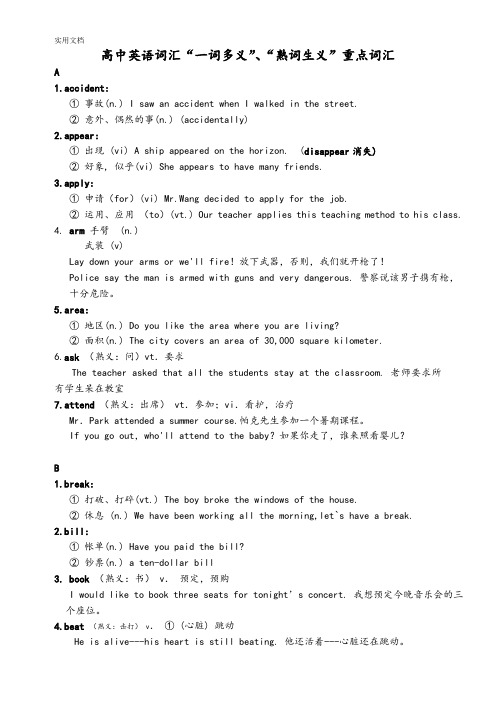
高中英语词汇“一词多义”、“熟词生义”重点词汇A1.accident:①事故(n.) I saw an accident when I walked in the street.②意外、偶然的事(n.) (accidentally)2.appear:①出现 (vi) A ship appeared on the horizon. (disappear消失)②好象, 似乎(vi) She appears to have many friends.3.apply:①申请(for)(vi) Mr.Wang decided to apply for the job.②运用、应用(to)(vt.) Our teacher applies this teaching method to his class.4. arm手臂 (n.)武装 (v)Lay down your arms or we'll fire!放下武器,否则,我们就开枪了!Police say the man is armed with guns and very dangerous. 警察说该男子携有枪,十分危险。
5.area:①地区(n.) Do you like the area where you are living?②面积(n.) The city covers an area of 30,000 square kilometer.6.ask (熟义:问)vt.要求The teacher asked that all the students stay at the classroom. 老师要求所有学生呆在教室7.attend(熟义:出席) vt.参加;vi.看护,治疗Mr.Park attended a summer course.帕克先生参加一个暑期课程。
If you go out,who'll attend to the baby?如果你走了,谁来照看婴儿?B1.break:①打破、打碎(vt.) The boy broke the windows of the house.②休息 (n.) We have been working all the morning,let`s have a break.2.bill:①帐单(n.) Have you paid the bill?②钞票(n.) a ten-dollar bill3.book(熟义:书) v.预定,预购I would like to book three seats for tonight’s concert. 我想预定今晚音乐会的三个座位。
高中英语单词趣味记忆法附必须记住的300个核心词汇
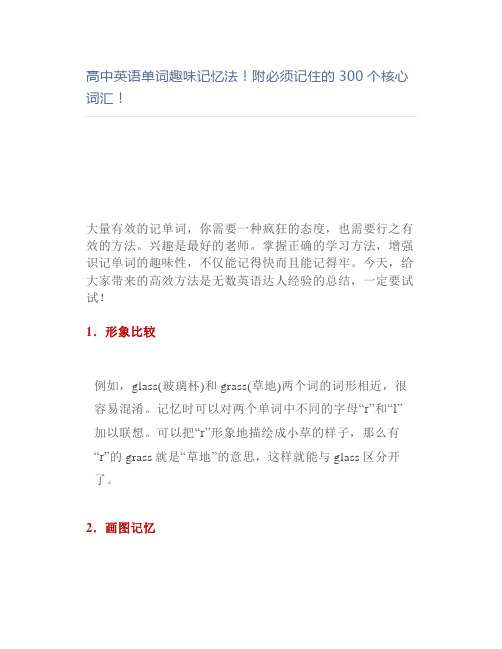
7. admire 钦佩
8. admit 承认
9. agreement 协议
10. agriculture 农业
(agricultural adj. 农业的)
11. altogether 总共
12. ancient 古代的
13. announce 宣布
14. anxiety 忧虑
例如,class(班级)去掉第一个字母后变成lass(少女,情人),去掉第二个字母又成了另外一个单词ass(傻瓜)。
6.谐音联系
将英、汉两种语言的发音相似之处进行对比来加深记忆。
例如,sand(沙)的发音跟汉语中的“散的”近似,可以想象人们常说的“一盘散沙”。通过谐音联想也能记住这个词。
7.逆向思维
31. beauty 美 (beautiful adj.)
32. believe相信
(belief n. 信念,其复数是beliefs)
33. beyond 超过
34. biology 生物
35. birthday 生日
36. bravery 勇敢
37. broadcast 广播 (过去式、过去分词同原形
又如,museum(博物馆)一词就跟古希腊神话有关。相传古代埃及人建造了第一个收藏文物的博物馆,以希腊女神缪斯(Muse)命名,后来在欧洲许多语言演变的过程中表示“博物馆”的词始终都用museum。
接下来,总结了一些英语单词记忆前缀,希望对同学们记单词有所帮助!
一.表示否定的前缀
1.dis-加在名词、形容词,动词之前
45. character 性格
46. charge 收费
47. cinema 电影院
48. comfort v.&n. 安慰,使舒适 (comfortable adj.舒适的
高中一年级英文单词掌握要点
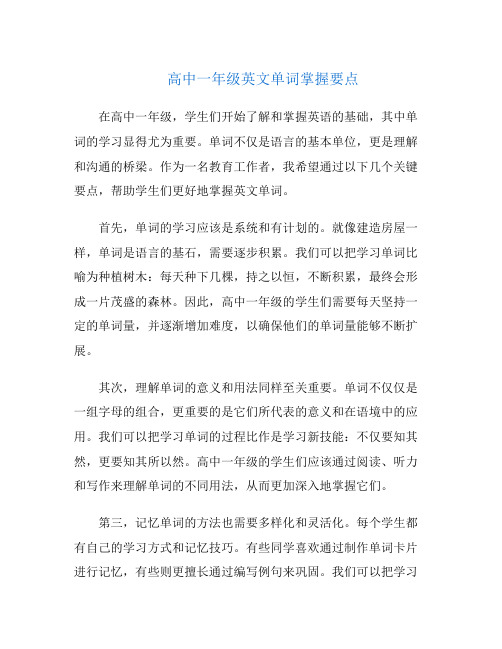
高中一年级英文单词掌握要点在高中一年级,学生们开始了解和掌握英语的基础,其中单词的学习显得尤为重要。
单词不仅是语言的基本单位,更是理解和沟通的桥梁。
作为一名教育工作者,我希望通过以下几个关键要点,帮助学生们更好地掌握英文单词。
首先,单词的学习应该是系统和有计划的。
就像建造房屋一样,单词是语言的基石,需要逐步积累。
我们可以把学习单词比喻为种植树木:每天种下几棵,持之以恒,不断积累,最终会形成一片茂盛的森林。
因此,高中一年级的学生们需要每天坚持一定的单词量,并逐渐增加难度,以确保他们的单词量能够不断扩展。
其次,理解单词的意义和用法同样至关重要。
单词不仅仅是一组字母的组合,更重要的是它们所代表的意义和在语境中的应用。
我们可以把学习单词的过程比作是学习新技能:不仅要知其然,更要知其所以然。
高中一年级的学生们应该通过阅读、听力和写作来理解单词的不同用法,从而更加深入地掌握它们。
第三,记忆单词的方法也需要多样化和灵活化。
每个学生都有自己的学习方式和记忆技巧。
有些同学喜欢通过制作单词卡片进行记忆,有些则更擅长通过编写例句来巩固。
我们可以把学习单词比作是准备食物:有的人喜欢炒菜,有的人则更喜欢烤肉,关键在于选择合适自己的方法,并持之以恒。
最后,实践是检验掌握程度的最佳方法。
高中一年级的学生们应该尽可能多地运用他们所学的单词,参与到课堂讨论、小组活动以及日常对话中。
只有通过实际运用,才能真正巩固和加深对单词的理解和掌握。
综上所述,高中一年级的英文单词掌握不仅仅是学习,更是一种能力的培养。
通过系统的学习计划、深入的理解、多样化的记忆方法以及实际的应用,学生们可以在英语学习的道路上稳步前行,为将来更高层次的语言学习奠定坚实的基础。
高中英语必背必考知识点总结整理

高中英语必背必考知识点总结整理高中英语必背必考知识点总结整理对于英语词性语态的掌握,我们通过复习课本的例句,总结归纳这些句型的特点、用法及它们的适用条件,既掌握英语的基本句型用法,又可以促进我们的英语谴词造句能力。
下面是小编为大家整理的高中英语必背必考知识点总结,希望对您有所帮助!情态动词与助动词1、can能,可以,表说话人同意,许可还可表客观条件许可,如:You can go now.提建议或请求时可用can I, can you表客气,如Can I buy you a drink?can和be able to表能力时的区别。
can表一般具有的能力,be able to表在特定条件下的能力,如:Although the driver was badly hurt,he wasable to explain what had happened.2、may(1)可以,表说话人同意,许可或请求对方许可。
You may go.(2)(现在和将来)可能,也许,只用于肯定句和否定句中,如He may not be right.3、must,have tomust表主观上的必须,have to表客观上的必须,如:It's getting late. I have to go. -Must I go now.-Yes,you must.(No, you needn't./ No, you don't have to.)4、need,dare这二词有实意动词和情态动词两种词性,如用作实意动词后接动词不定式to do,如用作情态动词后接动词原形。
NeedI go now? --Yes, you must./No, you needn't.)5、shall用于第一人称疑问句中表说话人征求对方的意见或向对方请求,如,Shall we begin our lesson?用于二、三人称陈述句,表说话人命令、警告、允诺、威胁等口吻,如: You shall fail if youdon't workharder.6、should表应该,意为有责任,有义务。
高中英语重点知识点归纳总结

高中英语重点知识点归纳总结高中英语作为学习英语的重要阶段,其知识点的涉及范围极其广泛,需要我们在高效学习的前提下,掌握一些重点知识点,才能够在学习中游刃有余,取得更好的成绩。
在这篇文章中,我将把自己的学习经验和笔者的认知整合在一起,为大家归纳总结以下高中英语重点知识点。
1. 英语语法英语语法是英语学习中最基础的部分,包括词汇、动词时态、名词性从句、形容词和副词的比较级和最高级、情态动词等等。
其中动词时态和语态,被认为是高中英语语法的重点部分。
要牢固掌握这些知识,需要多做题、多训练,才能够巩固知识点,并逐渐提高语感。
2. 英语阅读高中英语阅读包括了理解短文主题、分析文章结构、推理作者意图、理解语言语境等方面。
在这些阅读技巧中,第一步是强化词汇量,以方便更好的理解和快速阅读。
建议学生学习阅读过程中注意提高阅读效率,而不是过度关注细节问题,在提高阅读速度的同时把握全局,抓住文章中的主题。
3. 英语写作高中英语作文包括了议论文、说明文、记叙文和应用文等不同类型。
写作时要遵循语法规范,注重词与词之间的搭配、语气和情境。
同时,在写作期间,保持连贯性以及文章组织能力也是非常重要的环节。
写作阶段,可以多参照样例文以及文学作品,通过模仿技巧来提高自己的写作技能。
4. 英语口语在英语学习中,口语是非常重要的环节。
建议学生多通过学习口语技巧、听音频、对话以及表演等形式来提高口语水准。
多参加讨论或者交流活动,可以在语言实践中更好的练习口语。
5. 英语词汇英语词汇是英语学习中最必要的物件之一。
如果你想要提升自己的英语水平,必须要注意单词的积累。
特别是对于英语成语、习语、派生词、专业词汇等方面,要加强记忆和积累。
多利用单词书籍、app等工具,加强单词学习。
6. 英语听力听力在提高英语综合能力方面具有不可替代的重要作用。
高中英语听力重点是近似语、同音异义词等,还有网述中的口音、速度等因素。
建议学生可以多陪听英语广播、BBC新闻等而提高听力水平。
高考英语单元知识点复习Unit 12
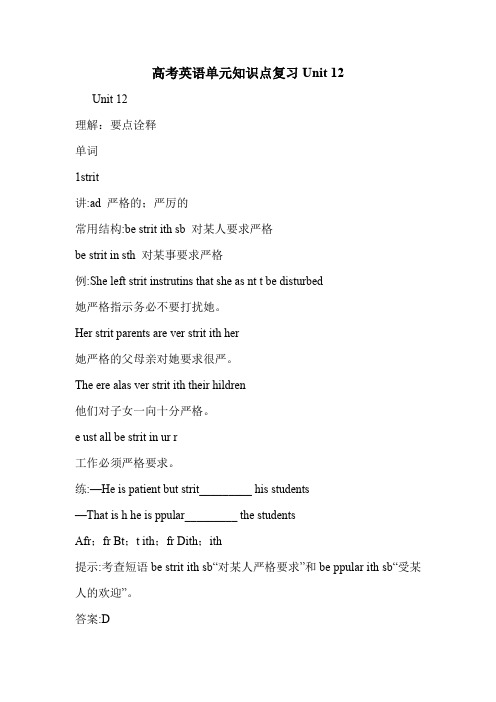
高考英语单元知识点复习Unit 12Unit 12理解:要点诠释单词1strit讲:ad 严格的;严厉的常用结构:be strit ith sb 对某人要求严格be strit in sth 对某事要求严格例:She left strit instrutins that she as nt t be disturbed她严格指示务必不要打扰她。
Her strit parents are ver strit ith her她严格的父母亲对她要求很严。
The ere alas ver strit ith their hildren他们对子女一向十分严格。
e ust all be strit in ur r工作必须严格要求。
练:—He is patient but strit_________ his students—That is h he is ppular_________ the studentsAfr;fr Bt;t ith;fr Dith;ith提示:考查短语be strit ith sb“对某人严格要求”和be ppul ar ith sb“受某人的欢迎”。
答案:D2selet v&ad讲:动词selet表示“选择;挑选;选拔(尤指最好的或最合适的)”,;“精选的”。
动词selet表示seletin n 选拔、挑选,为不可数名词,表示“挑选出的事项或人”时,为可数名词。
例:She as seleted as the parliaentar andidate fr Bath她被选为巴斯地区的议员候选人。
Six theatre panies have been seleted t tae part in this ear’s festival已选定六个剧团参加今年的戏剧节。
The an seleted a vegetable dish fr the enu那位女士从菜单中选了一个素菜。
The final tea seletin ill be ade trr明天将确定队伍的最后人选。
高中英语语法概念归纳总结
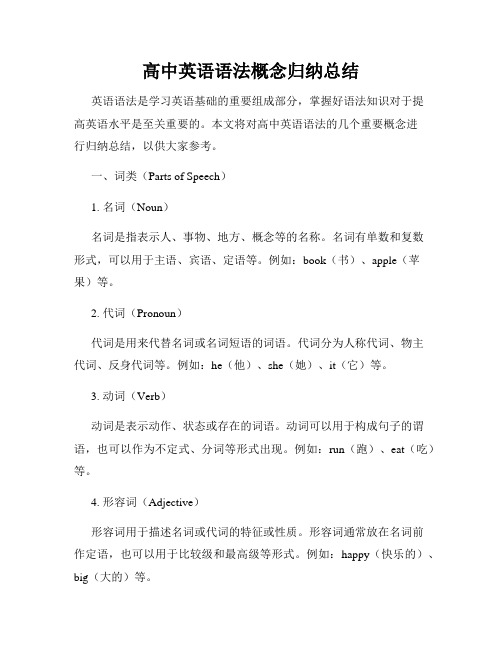
高中英语语法概念归纳总结英语语法是学习英语基础的重要组成部分,掌握好语法知识对于提高英语水平是至关重要的。
本文将对高中英语语法的几个重要概念进行归纳总结,以供大家参考。
一、词类(Parts of Speech)1. 名词(Noun)名词是指表示人、事物、地方、概念等的名称。
名词有单数和复数形式,可以用于主语、宾语、定语等。
例如:book(书)、apple(苹果)等。
2. 代词(Pronoun)代词是用来代替名词或名词短语的词语。
代词分为人称代词、物主代词、反身代词等。
例如:he(他)、she(她)、it(它)等。
3. 动词(Verb)动词是表示动作、状态或存在的词语。
动词可以用于构成句子的谓语,也可以作为不定式、分词等形式出现。
例如:run(跑)、eat(吃)等。
4. 形容词(Adjective)形容词用于描述名词或代词的特征或性质。
形容词通常放在名词前作定语,也可以用于比较级和最高级等形式。
例如:happy(快乐的)、big(大的)等。
5. 副词(Adverb)副词用于修饰动词、形容词、副词以及整个句子。
副词可以表示时间、地点、方式、程度等。
例如:quickly(快速地)、often(经常地)等。
6. 介词(Preposition)介词用于表示人或物的关系、位置或移动方向等。
介词通常与名词或代词构成介词短语,用于修饰其他词语。
例如:in(在)、on (在……上)等。
7. 连词(Conjunction)连词用于连接词与词、词与短语、短语与短语,起到连接句子成分的作用。
常见的连词有and(和)、but(但是)等。
8. 冠词(Article)冠词用于限定名词或名词短语的特指与泛指关系。
冠词包括定冠词“the”和不定冠词“a/an”。
例如:the book(这本书)、a car(一辆车)等。
二、时态(Tenses)1. 一般现在时(Simple Present Tense)一般现在时用于表示经常性的动作、现实状态、客观真理等。
高考英语熟词生义归纳

高考英语熟词生义归纳在英语学习中,我们经常会遇到一个有趣的现象,就是我们熟悉的单词在不同的语境下会有不同的含义。
这种现象在高考英语中尤为常见,因此,本文将对此进行一些归纳和总结。
一、单词“set”我们熟悉的“set”一词通常表示“设置”或“放置”,但在某些语境下,它会有完全不同的含义。
例如,在数学中,它可能表示“集”,而在英语口语中,它可能表示“悲伤”。
在写作中,如果你想表达“把某物设置为某种状态”的意思,你可以使用“set up”这个短语。
二、单词“go”“go”是英语中最常用的单词之一,但它也有一些不太常见的含义。
例如,“go off”可以表示“离开”,“go through”可以表示“经历”,“go up”可以表示“上升”。
在表达这些意思时,需要注意语境和搭配。
三、单词“put”与“set”类似,“put”也是一个常见的英语单词,但它在不同的语境下也有不同的含义。
例如,“put up”可以表示“提供”,“put off”可以表示“推迟”,“put down”可以表示“放下”。
同样,在写作中,如果你想表达“把某物放在某个位置”的意思,你可以使用“put in/on/down”等短语。
四、单词“get”“get”是一个非常常用的英语单词,但它也有许多不同的含义和用法。
例如,“get up”可以表示“起床”,“get to”可以表示“到达”,“get back”可以表示“回来”。
“get”还可以与其他单词组合形成许多常用的短语,如“get through”(通过)和“get over”(克服)。
五、单词“take”“take”是一个非常灵活的英语单词,它可以表示许多不同的意思。
例如,“take off”可以表示“起飞”,“take over”可以表示“接管”,“take down”可以表示“记下”。
在表达这些意思时,需要注意语境和搭配。
以上是一些常见的熟词生义的例子,它们展示了英语单词的多样性和灵活性。
高中英语词汇学习需要掌握的十二个概念63页PPT

41、学问是异常珍贵的东西,从任何源泉吸 收都不可耻。——阿卜·日·法拉兹
42、只有在人群中间,才能认识自 己。——德国
43、重复别人所说的话,只需要教育; 而要挑战别人所说的话,则需要头脑。—— 玛丽·佩蒂博恩·普尔
44、卓越的人一大优点是:在不利与艰 难的遭遇里百折不饶。——贝多芬
要掌握的十二个
概念
21、没有人陪你走一辈子,所以你要 适应孤 独,没 有人会 帮你一 辈子, 所以你 要奋斗 一生。 22、当眼泪流尽的时候,留下的应该 是坚强 。 23、要改变命运,首先改变自己。
24、勇气很有理由被当作人类德性之 首,因 为这种 德性保 证了所 有其余 的德性 。--温 斯顿. 丘吉尔 。 25、梯子的梯阶从来不是用来搁脚的 ,它只 是让人 们的脚 放上一 段时间 ,以便 让别一 只脚能 够再往 上登。
高中英语新课程标准词汇表12
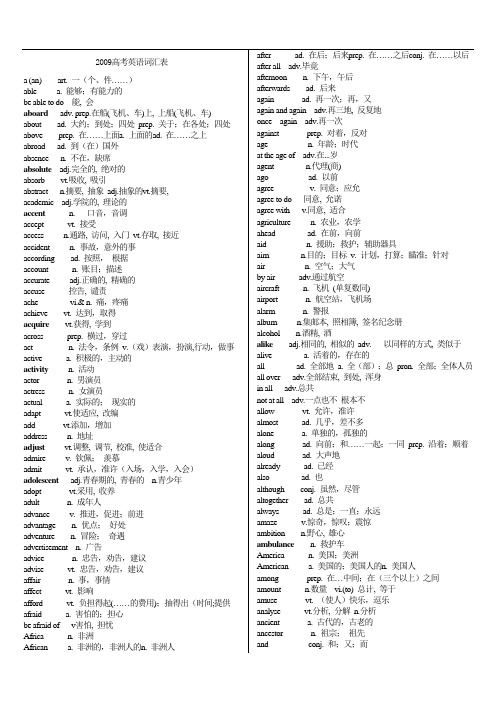
asas…asnot as / so as if / though ashbegin(began,begun) v.开始,开端在...初守规矩,行为prep. (表示位置buy(bought,bought) vt.靠近,在……by bus /car plane / train / ship / air目录catch(caught,caught) v. 接住;捉住;赶上;染上(疾病)v.赶上牛(总称),家畜原因,起因谨慎的chat n. & vi.聊天,闲谈cheap 便宜的,贱cheat n. & v. 骗取,哄骗;作弊check 检查;批改cheek 面颊,脸蛋cheer n. & vi.欢呼;cheese 奶酪chemistry n. 化学cheque (美check) n. 支票箱子;盒子;胸部dare v.& aux.敢,敢于dark 黑暗;暗处;日暮darkness 黑暗,阴暗data资料,数据debt n. 债务;decade n.十年,December n. 12月部门;司,处;依靠,依赖,指望;取决于描写,叙述do some cleaning / cooking / shoppingdo well in 成绩好,...做得好doctor n. 医生,大夫;博士document n. 文件;文献drink(drank,drunk) v. n.drive(drove,driven) v. 驾驶,开(车);驱赶滴v. 掉下,落下;投递;放弃溺死;淹没药,药物;毒品醉的each a.& pron.每人,每个,每件each other 彼此, 互相eager 渴望的,热切的耳朵;耳状物;听力,听觉early ad. 早地ice cream n. idea identity ignoreknow(knew,known) v. 知道,了解;认识;懂得n.n. 实验室n.n.& vt.关心make (made,made) vt. 制造,做;使得由...所做成的(用于原材料不易看出的场合在……用...造成用于原材料显而易见的场合a. 男(性)的;雄的mean(meant,meant)vt. 意思是,意指n. 意思,含意n. 方法,手段;财产ad. 同时v. 量prep. & a.负的,减去的minute 分钟;一会儿,瞬间in a minute , 立刻just a minute 等一会儿misunderstand (stood, stood) v.v. 混合,搅拌a. 活动的,可移动的n. 模型,原形;范例;模范a. 现代的a. & ad.最多n. 母亲n. 发动机,马达n. 山,山脉a. 多山的aux.& v.需要,必须通过,邻居,邻人praise n.& vt.赞扬,表扬precious 珍贵的predict , 预报prefer 宁愿(选择),更喜欢prepare 预备;归还重新调查;复习,温习革命,变革奖赏ed,ed)微笑冒烟;吸烟光滑的;平坦的蛇般爬行;蜿蜒行进sweep(swept,swept) v. 扫除,扫甜食;蜜饯;甜点;糖果;芳香快的,迅速的tax free a.taxi n. 出租汽车tea n. 茶;茶叶teach(taught,taught) v.teacher n. 教师,教员合作,协同工作telephone booth或telephone box n.tell (told, told) vt. 告诉;讲述;吩咐temperature n. 温度temple n. 庙宇,寺院temptation n. 引诱;诱惑that a.& pron.那,那么,那样the art. 这(那)个,这(那)些(用于特定人或物,序数词,最高级,专有名词,世上独一theatre (美theater) n. these a. & pron.这些they pron. 他(她)们;它们;人们thick a. 厚的thief (复thieves) n. 窃贼thin a. 薄的;瘦的;稀的this a.& pron.这,这个thorough a. 彻底的those a.& pron.那些though conj. 虽然,可是thought n. 思考,思想thousand num. 千thread n. 线throw(threw,thrown) v. 投,掷,扔雷声,打雷雷电交加的暴风雨星期四因而tomorrow ad. & n.明天(重量单位)吨舌,舌头tonight ad.& n. 今晚,今夜也,还;又;太,过分;很transport n.& vt.运输陷阱vt. 使陷入困境travel n.& vi.旅行triangle n.& adj.三角形;三角形的诡计,把戏旅行,旅程trolley bus n. 无轨电车troop troops vi. n. 成群结队地走T shirt n. TTuesday n.turkey n.turn v.turning n.twenty first num.twenty one num.twin n. 双胞胎之一two num. 二type vt. 打字typewriter n.) =the United Nations n.不能的,不能胜任的不确定的叔;伯;舅;姑夫;姨父under ad.& prep. 在……下面use n.& vt.利用,使用,应用used a. 用过的;旧的;二手的useful a. 有用的,有益的useless a. 无用的user n. 使用者;X ray n. Xyard n.year n.yellow a.yes ad.zero n. & num.零;零度;零点zip v.& n.拉开(或扣上zip code(美) =postcode(zipper n. 拉链zone n. 区域;范围zoo n. 动物园今当远离,临表涕零,不知所言。
高中英语词汇学习需要掌握的十二个概念(共61张)

(1)She picked up the phone and put it on the table. __拿__起______
(2)The bus stopped several times to pick up passengers. ___接__送_____
(3)I refuse to pick up after children who are old enough to keep their
weeks!
_得__到___;__买__到
(6)He has picked up some bad habits at that club. ____染__上____
二、词根
二、词根
英语单词构成有其规律,掌握了构词规律,可以高效记忆单词。 英语单词构词法的核心部分在于词根,词根决定单词的意思。
词根可以单独构成词,也可以通过加前缀(改变单词词义)或 后缀(决定单词词性)来构成新词。
___处__理_____
(5)In a perfect world, there would be the facilities and money to treat
every sick person.
___治__疗_____
Deliberate practice
根据上图pick up语义发展规律,写出画线部分在下面语境中的汉 语意思。
(__想__法__、__思__想__等__)__从__脑__中__掠__过__
(3) Owen crossed the ball for Cole to head into the goal. _横__传__(__足__球__、__曲__棍__球__等__)__
Deliberate practice
- 1、下载文档前请自行甄别文档内容的完整性,平台不提供额外的编辑、内容补充、找答案等附加服务。
- 2、"仅部分预览"的文档,不可在线预览部分如存在完整性等问题,可反馈申请退款(可完整预览的文档不适用该条件!)。
- 3、如文档侵犯您的权益,请联系客服反馈,我们会尽快为您处理(人工客服工作时间:9:00-18:30)。
Deliberate practice
根据以上词根分析示例,写出下列画线单词的汉语释义。
(1)Some of the typewriters went to customers in his own country,
but he exported more to other countries.
(1)Do you prefer the smoking area or _n_o_n_-_sm__o_k_i_n_g_ the area, sir?
(2)In order to keep healthy, he decided to change the _u_n_h_e_a_l_th__y_ lifestyle.
weeks!
_得__到___;__买__到
ቤተ መጻሕፍቲ ባይዱ
(6)He has picked up some bad habits at that club. ____染__上____
二、词根
二、词根
英语单词构成有其规律,掌握了构词规律,可以高效记忆单词。 英语单词构词法的核心部分在于词根,词根决定单词的意思。
词根可以单独构成词,也可以通过加前缀(改变单词词义)或 后缀(决定单词词性)来构成新词。
(1)She picked up the phone and put it on the table. __拿__起______
(2)The bus stopped several times to pick up passengers. ___接__送_____
(3)I refuse to pick up after children who are old enough to keep their
把_…__…__驱__逐__出__境_
三、名词后缀
三、名词后缀
名词后缀,即由某些约定俗成的具有名词特征的词素形成的。 把这种后缀加在某个词后边,就可以使这个词变为名词。如表示 “性质,状况,行为,过程,总量,程度”的 -ance, -ence;表示 “性质,状态,程度”的-ity;表示“行为,状态,过程,手段及其 结果”的-ment, -tion。
五、词族
五、词缀
语言在发展过程中积累了很多发音和意义相通或相近的同源 词,不同的同源词可以一组一组地分开,每组自成系统,称为词族 (word family)。一个词族由它的基础形式、不同语法形式和最 常见的派生词组成。有意识地按照词族成组成串记忆,将大大提高 词汇的记忆效率。
Deliberate practice
“意识培养”:基本义
根据cross基本义“(画)十字架” ,写出画线部分在下面 语境中的汉语意思。
(4) Cross Dave’s name off the guest list — he can’t come. _划__掉__;__删__除___
(5) She was sitting on the floor with her legs crossed. ___盘__(__腿__)___
大部分单词的基本义就是词源义,部分单词的词源义在语言发 展过程中消失了,但总能找到一个各层义项的共同的衍生基础,即 基本义。
紧紧抓住贯穿始终的基本义,培养学生依据基本义在语境中推 测词义的能力,可以帮助学生轻松攻克高频多义词的学习和记忆。
Deliberate practice
“意识培养”:基本义
(3)Encourage the whole family to help build a supportive
environment that children need for success in school. ____反__应__;__回__应
(4)He was deported from the country when his visa expired (到期).
根据上图 treat 语义发展规律,写出画线部分在下面语境中的汉
语意思。
(1)Young people should always treat the elders with respect.
__对__待_____
(2)My parents still treat me like a child.
__对___待____
选出适当的词,并用其正确形式填空。
courage, discourage, discouraged, discouraging, encourage, encouraged, encouragement, encouraging
(1)Perhaps I can offer a few words of _e_n_c_o_u_r_a_g_e_m__en_tto those who didn’t win any prize this time.
Deliberate practice
“意识培养”:否定前缀
(3)“Reduce” is formal, while “cut down” is _i_n_f_o_rm__a_l_. (4)I don’t _d_i_s_li_k_e__ him, but I don’t really like him much
part of the people needed. (4)A good _e_d_u_c_a_t_io_n_ (educate) gives your child a head start in life. (5)Workers in the factory are encouraged to use the library for
(2)Don’t let a busy schedule __d_is_c_o_u_r_a_g_e you from making some great changes in the way you eat and live!
(3)Pick yourself up. _C__o_u_r_a_g_e_ is doing what you’re afraid to do. (4) Stores notice that the smell of baked goods e_n_c_o_u_r_a_g_e_sshopping. (5) Why is winning Olympic medals so e_n_c_o_u_r_a_g_i_n_g_?
___处__理_____
(5)In a perfect world, there would be the facilities and money to treat
every sick person.
___治__疗_____
Deliberate practice
根据上图pick up语义发展规律,写出画线部分在下面语境中的汉 语意思。
根据cross基本义“(画)十字架” ,写出画线部分在下面 语境中的汉语意思。
(1) Put a cross after each wrong answer. ____叉__号______
(2) Several thoughts crossed my mind as I watched him
work.
◆ Mrs Martin, their elderly neighbor, was unable to take care of her yard, so Serena’s dad had volunteered Serena for this job.
◆ I can’t believe how some intelligent adults misunderstand young people.
own things in order.
_收___拾__东__西__
(4)He picked up Japanese while living in Japan.
___学__会_____
(5)Where did you pick up that book? I’ve been trying to get it for
(6) I phoned him up and got a crossed line. _____串__线_____
(7) Believe in them, and your paths will cross! 你__们__将__不__期__而__遇__;__邂__逅___
Deliberate practice
(3)Before the show, he treated us to dinner at a restaurant and taught
us not to talk with our mouths full.
___款__待____
(4)It was many years before the city began to treat its water pollution.
either. (5)Smoking is considered as a(n) _a_n_ti_-_so_c_i_a_l habit, which
may cause some social problems. (6)Sarah was usually patient, but she got _i_m_p_a_t_i_e_n_t_
____出__口______
(2)You should have something ready just in case, like a portable
radio, a flash light, a rope, and some candles and matches.
___便__携__式__的___
him I was proud. (2)All he needs is a stick, a garden rake and most importantly, his
livelyi_m_a_g_i_n_a_t_io_n(imagine)! (3)In any theatrical p__er_f_o_r_m__a_n_ce(perform) the actors are just a small
